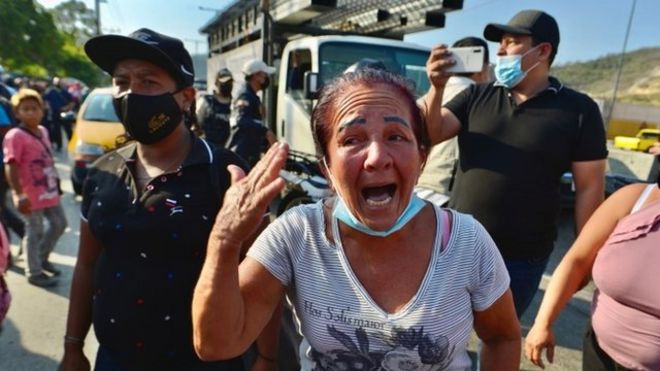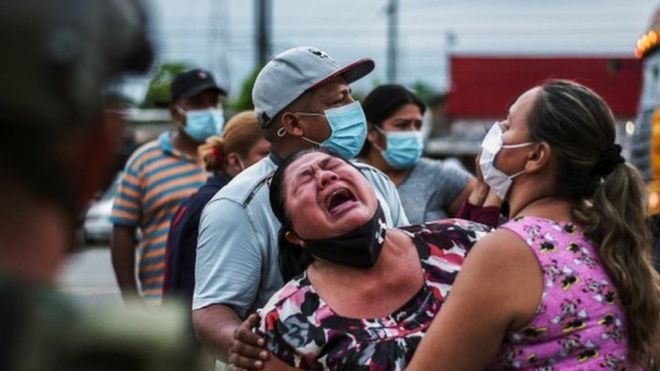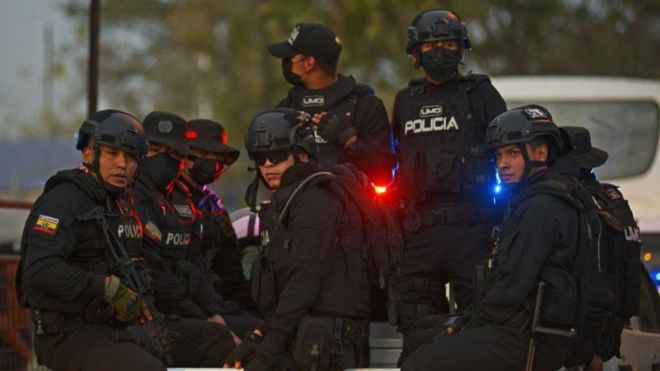How GUAYAQUIL, has become the city of fear ?.
It began with the spectacular arrival of the pandemic that flooded the streets, houses, hospitals and cemeteries of corpses. Today the hitmen and the murders in the Litoral Penitentiary are our daily bread.
GUAYAQUIL, which will celebrate 201 years of its independence on October 9. In this time it went from being the most important port and naval shipyard in Spain, on the Pacific coast of South America, to be the city of fear, where poverty climbs the hills and death or violence are everywhere.
In these 200 years it has experienced deterioration in all senses, becoming the problem city of Ecuador, because from it when the worst criminals are not born, the worst politicians and white-collar thieves are born, who compete with the liars and hypocrites of Quito and Cuenca.
Of course, the exception makes the rule, there have been brilliant human beings who became presidents, musicians, writers, athletes.
But Guayaquil, during this pandemic and this acute economic crisis, has become the territory of disputes between two cartels, the Los Lagartos cartel, which is the cartel of drug traffickers from Guayaquil, and that of the Choneros, which is the drug cartel of the Manabi province, the neighboring province. The dispute over ports, the first is the port of Guayaquil and the second is the Port of Manta, the two most important commercial ports in the country.
Los Choneros are called that way because they originated in Chóne, a city in the province of Manabí where its inhabitants have more white features than mestizos or blacks, on the other hand, Los Lagartos, or Los Lobos, originate in Guayaquil, in the slums of the south from the city, where most of the population is mestizo, mulatto, and black.
They are called Lizards. because they have a principle, to be like lizards, that is, with a very large mouth to cajole or deceive, and to catch the largest prey, to be stealthy like lizards and, fundamentally, it is based on the principle that lizard swallows do not vomit, that is, the one who enters they have to kill, they have to steal, they have to traffic, and they have to keep quiet, they cannot betray, they cannot vomit anything from their past, or what they have done, or have, or betray or hand over his companions and if he does, his life is sentenced to death.
Today the Choneros supply the Sinaloa cartel and the Lagartos supply the Jalisco Nueva Generación cartel, which are the two most important and famous drug trafficking cartels in Mexico and the world. These cartels have brought the drug war to Ecuador, which has been involved in the War on Drug Trafficking since 2000 when President Jamil Mahuad gave the United States the Manta base to carry out this war under the name of Plan Colombia. in the days of George Bush Jr.
We came out of this war in 2008, in which the New Constitution promoted by Correa, prohibited foreign military bases in Ecuador, and the Americans returned the Manta base in 2010, but in 2017, Lenín Moreno gave Donald Trump, two military bases, Manta, and Galapagos. where they were from 1941 to 1946. in which President Velasco Ibarra removed them, for their complicity in the Peruvian invasion of Ecuador, in 1936. North American President Delano Roosevelt ceded him the Ecuadorian territory that Peru now possesses, in the upper margin of the Amazon.
The US military occupies these bases disguised as instructors, of the Ecuadorian military to whom they supposedly provide technical assistance and training.
So far this collaboration of the USA has not borne fruit because drug trafficking has multiplied and we have become the main corridor of Peruvian and Colombian drugs, due to the facilities of our coasts, the corruption in its police and military commands, plus others. factors.
This corruption in the police and the army was visible since the time of Lenin Moreno, during the kidnapping and murder of journalists from the Diario El Comercio de Quito, by the leader of the FARC narco guerrilla group, the group called Oliver Simesterra, led by Water Arizala, its Afro-Ecuadorian commander, who paid the Ecuadorian military to traffic drugs, until they betrayed them, for which he fought a war against the armies of Ecuador and Colombia, being killed by the Colombian army.
Commander Washo, as they knew him, was one of El Gerald's main suppliers, the Ecuadorian Pablo Escobar, who had the best drug trafficking network in the Pacific, with speedboats or go-fast, piloted by the best sailors in the Pacific, who they are Ecuadorian fishermen, since before the Spanish Conquest, and fishing boats that provided them with Ecuadorian fuel, which is the cheapest in the region, due to the gasoline subsidy to fishermen, which this country provides.
El Gerald took over the business of the Norte del Valle Cartel, in Colombia, until he was caught and deported to the United States, for having brought almost 300 tons of cocaine into that country. This drug trafficker had as a partner Walter Arizala's brother, who was arrested along with Gerald in Colombia.
The Lizards, on the other hand, have weapons, training, and contact with the Jalisco Nueva Generación Cartel. which is the most violent cartel in Mexico and they work with the Zetas, who were Mexican police or military, highly trained in asymmetric warfare, torture and internal violence by the CIA, the DEA, the Mexican army and the US army until they decided to convert. in narcos.
The crimes committed in the Litoral Penitentiary, which now total more than 180 corpses, many of which were prisoners for alimony for their children, or minor offenses, or non-aggravated robbery, but were innocent victims of violence, due to malpractice injustice in Ecuador, such as preventive detention, political persecution, or imprisonment for food, which produces overcrowding, prison corruption, and the frequent abnormalities that occur in this and almost all the country's prisons.
At this time, the relatives of the injured and the dead have the right and the obligation to file a lawsuit against the Ecuadorian State, for not guaranteeing their lives in jail, because in the same place, psychopathic murderous prisoners coexist in overcrowded conditions, highly dangerous with people who are imprisoned for a traffic accident.
This must mean a multi-million dollar lawsuit before the International Criminal Court and the Human Rights Courts, so that the government of Guillermo Lasso pays what those courts determine, as reparation to those who saw their lives in danger and those who lost a family member.
We hope that the international courts will sanction the government of Ecuador in an exemplary manner. for not guaranteeing the life or minimum conditions for the rehabilitation of the prisoners and that this large economic sanction, as a warning to the Latin American governments, which have prisoners in similar conditions as Ecuador.
¿Cómo GUAYAQUIL, se ha convertido en la ciudad del miedo?.
Empezó con la espectacular llegada de la pandemia que inundó las calles, casas,
hospitales y cementerios de cadáveres. Hoy son los sicarios y los asesinatos en la Penitenciaría del Litoral el pan nuestro de cada día.
Ecuador: 3 claves que explican qué hay detrás de la peor masacre carcelaria en la historia del país
- Redacción
- BBC News Mundo
Fin del contenido de YouTube, 1
Si no puedes ver el guion haz clic aquí.
Al menos 116 fallecidos y cerca de 80 heridos, todos presos.
Con el saldo de 116 muertos y cerca de 80 heridos, el último enfrentamiento entre bandas rivales en el Centro de Privación de Libertad Número 1 en Guayaquil, se convirtió en el más sangriento de la historia carcelaria de Ecuador.
El cruento episodio, que incluyó decapitaciones y mutilaciones, llevó al presidente Guillermo Lasso a declarar el Estado de Excepción en todas las cárceles del país.
Aunque esta es la peor y más mortífera, no es la primera matanza ocurrida en cárceles ecuatorianas, algo que los expertos adjudican a la creciente actividad del narcotráfico en el país.
Final de Quizás también te interese
En este video te explicamos esa y otras claves que explican qué hay detrás de esta masacre.





No hay comentarios:
Publicar un comentario